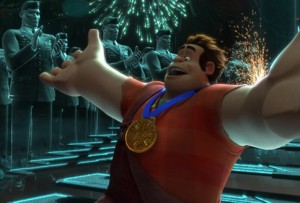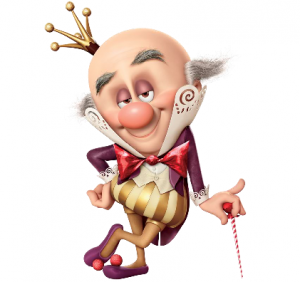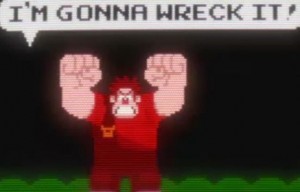WRECK-IT RALPH is a game-changer
 Some of the most interesting narrative notes in the movie Wreck-It Ralph aren’t possible to discuss without racing into spoiler territory, which is why we left them out of our initial video review and focused on the themes of changing ourselves, self-seeking, and true transformation.
Some of the most interesting narrative notes in the movie Wreck-It Ralph aren’t possible to discuss without racing into spoiler territory, which is why we left them out of our initial video review and focused on the themes of changing ourselves, self-seeking, and true transformation.
However, if you’re looking for a few more important facets to reflect on after seeing the film (or if you don’t mind a few plot reveals including the ending) by all means, drop in another quarter.
CONTINUE? (insert spoiler) 9, 8, 7, 6. 5, 4, 3, 2, 1…
1. Starting out on the wrong foot
At the film’s beginning, Ralph is treated poorly, to be sure. Fight Club’s Tyler Durden rightly informed me “you are not your job” back in 1999, and yet these schmoes in Fix-it Felix’s building never learned that lesson. It’s tantamount to treating your garbage man as if he’s garbage. These people have image problems, but our protagonist’s solution is ultimately no wiser than his neighbors’ worldview. Ralph’s initial quest is just to grab a hero’s medal, to “rack up an achievement”, to get something impressive and shiny in the hopes that a badge of glory will make people like and respect him. He doesn’t even earn it, but steals it after the Hero’s Duty campaign is over.
 We can all relate with this desire to short-cut being loved. At some point we probably all seek fame, a degree, an accolade, or we just buy a rocking wardrobe, erecting an impressive exterior of some sort instead of focusing on who we are inside. Instead of working to counter the oppressive culture, we wind up… well, just playing its game.
We can all relate with this desire to short-cut being loved. At some point we probably all seek fame, a degree, an accolade, or we just buy a rocking wardrobe, erecting an impressive exterior of some sort instead of focusing on who we are inside. Instead of working to counter the oppressive culture, we wind up… well, just playing its game.
2. True Nature
Fortunately for Ralph, misdirected motives and methods providentially lead to an encounter with Vanellope von Schweetz. While she was designed to be a Princess with dignity and respect, she’s been told a lie. Her world has told her that she’s not a lovely girl, but a mistake, an accident… and that her gifts are nothing more than a glitch. She’s told she doesn’t even belong in the game, but she won’t accept this lie. She reminded me of a little girl from another film by Alfonso Cuaron:
 “I am a princess. All girls are. Even if they dress in rags, even if they aren’t pretty, or smart, or young. They’re still princesses. All of us. Didn’t your father ever tell you that? Didn’t he?” – A Little Princess (1995)
“I am a princess. All girls are. Even if they dress in rags, even if they aren’t pretty, or smart, or young. They’re still princesses. All of us. Didn’t your father ever tell you that? Didn’t he?” – A Little Princess (1995)
In a world that emerged from a mindless big bang (or no game designer) it might be true that all girls (and boys) would be mere accidents without dignity or destiny. Meaningless mutations. Fleeting glitches. However, in a worldview where a loving father (God) designed us, we see a different reality. Just as in the Chronicles of Narnia, where the lion Aslan speaks with affection to the kids as “daughters of Eve” and “sons of Adam”, we see an inherent dignity and identity as children of God. Applied to this film, whether it’s the state of Vanellope’s world in “Sugar Rush” or the treatment of Wreck-It Ralph by his neighbors in the Fix-it Felix Junior game, the idea is this:
They (and we) have an identity that transcends what the world (or more specifically those in it) seek to impose on them (us).
Deep down, don’t we know that? There is a reality that defies the conventions (even the “code”) of the world we live in, a nature that is somehow compromised, the truth of who we are covered up. Cynicism, doubt and group-think reinforce the lie. The very nature of the world has been corrupted, and the true story has been obscured, even overwritten. It’s the same thing Neo sensed in the opening of The Matrix. Something is wrong with the world.
3. A Goofy Serpent in a Candy Eden
 Ralph inadvertently stirs up the world of Sugar Rush, leading to the revelation that it’s self-proclaimed ruler, King Candy, is none other than the game-hopping and world-destroying Turbo. His pride led him to abandon his role and cause the desolation of other game landscapes, and now he’s usurped the sweet order of Sugar Rush and twisted the land into a delusion where he is it’s Lord and Master.
Ralph inadvertently stirs up the world of Sugar Rush, leading to the revelation that it’s self-proclaimed ruler, King Candy, is none other than the game-hopping and world-destroying Turbo. His pride led him to abandon his role and cause the desolation of other game landscapes, and now he’s usurped the sweet order of Sugar Rush and twisted the land into a delusion where he is it’s Lord and Master.
“He was a murderer from the beginning, and has nothing to do with the truth… he speaks out of his own character, for he is a liar and the father of lies… now will the ruler of this world be cast out.” – John 8:44, 12:31
But before we make King Candy, or Turbo, seem too distant as the devil in the story, let’s reflect: it’s the fear of obsolesence, of fading glory, that prompts this villain to act. It’s a desperation born of fleeting fame, the fear of being unplugged. Even greater than the fear of death (or at least coupled with it) is the fear that he’ll be forgotten, unsung and unloved. Is this not a fear we share, and one that tempts us toward equally desperate, self-serving acts of preservation and image-expansion in our lives? It even relates to Ralph: he leaves his game to get his first medal, a first achievement, so that people will like him. Without a transformed heart, what might he have done when that glory began to fade, when the medal’s power began to wane? He could have easily been just like Turbo, and this is punctuated by the fact that his actions almost cause his game – and Sugar Rush – to be destroyed and/or decommissioned.
 4. Wrecking for Life
4. Wrecking for Life
Naturally, the story takes us to the brink as two worlds (and a little girl’s life) dangle from a thread. All of Ralph’s intentions seem to have caused more grief, and this leads him to a sacrifice play… plummeting toward the Mentos and soda volcano to create an eruption and save Sugar Rush and Vanellope. Does it surprise us at this point to realize… that the ability and role he’s been so frustrated by throughout the film is exactly what’s needed to set things right and save the day?
To save the day, Ralph has to “wreck-it”.
Ralph’s abilities are precisely what’s needed at the right time to save the world of Sugar Rush, restore Vanellope to her rightful place as Princess, and overcome the self-appointed ruler of the world. It also has the internal benefit of reconciling Ralph’s own identity, his contentment with how he’s been made and what he exists to do. Relationships in his own game improve as well. Only in a designed narrative could this be anything more than wishful thinking… which makes us confront our own wishes or hopes in this life, and our world.
QUESTION: is there any REAL hope that our missteps, flawed intentions, quirks and proclivities in this life might be spun together into a satisfying, world-improving and identity-defining ending… even if we’ve screwed things up worse than Ralph, had our dream crushed like Vanellope, or hurt others like Turbo?
 “…but God meant it for good, to bring it about that many people should be kept alive…”
“…but God meant it for good, to bring it about that many people should be kept alive…”
– Genesis 50
“…all things work together for good, for those who are called according to His purpose.”
– Romans 8:28
The Christian knows peace and contentment in that our universe has a good and loving “game designer”, that there is no code ultimately out of His order or control, and thus the sweet story of Wreck-It Ralph reflects a real hope.



